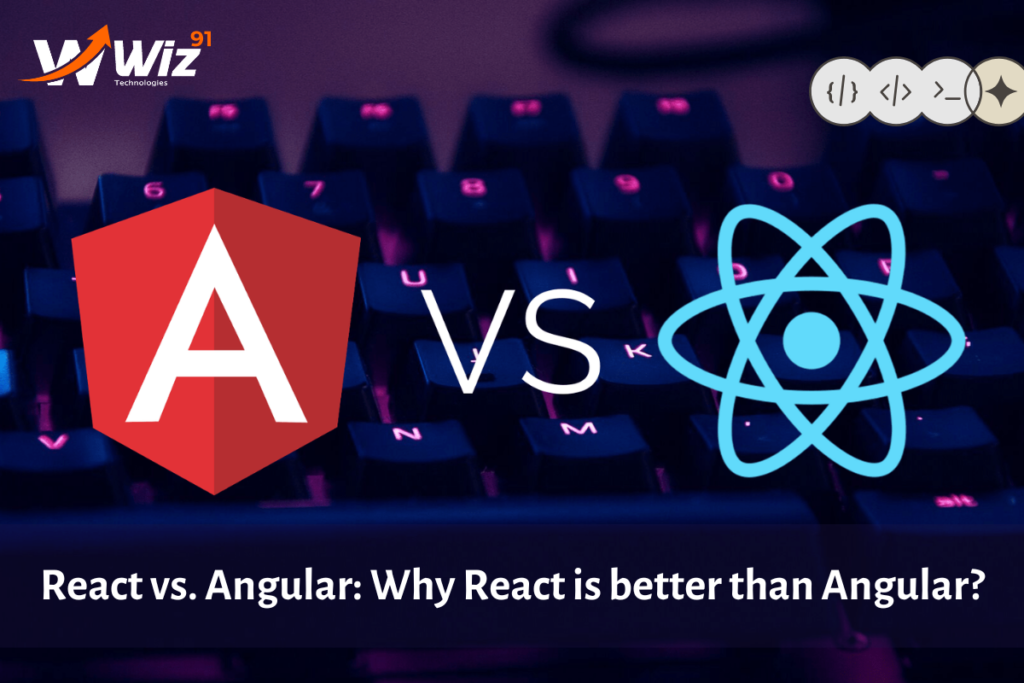Introduction On React vs. Angular:
When it comes to modern web development frameworks, React and Angular are two heavyweights that dominate the scene. While both have their merits, React has gained significant popularity and a strong developer community, making it the go-to choice for many developers. In this blog, we will explore the reasons why React is often considered better than Angular, highlighting (React vs. Angular) key advantages and strengths.
I. Simplicity and Lightweight Architecture (React vs. Angular):
React’s core philosophy revolves around simplicity and a component-based architecture. React’s declarative syntax allows developers to build UI components in an intuitive and straightforward manner. The use of JavaScript and JSX (a syntax extension for JavaScript) makes it easy to understand and work with React. On the other hand, Angular has a steeper learning curve, with a more complex and opinionated framework structure, involving concepts like modules, services, and dependency injection.
React’s lightweight nature also contributes to its popularity. Unlike Angular, React focuses solely on the view layer, making it a flexible and adaptable framework that can be integrated seamlessly into existing projects without imposing a full-stack approach. This simplicity and flexibility make React an ideal choice for building small to large-scale applications.
II. Virtual DOM and Performance (React vs. Angular):
React introduced the concept of a Virtual DOM, which is a lightweight representation of the actual DOM. When changes occur in the application, React compares the Virtual DOM with the real DOM and updates only the necessary parts, resulting in efficient rendering and enhanced performance. This approach significantly reduces the number of direct manipulations to the DOM, leading to faster updates and improved overall application speed.
Angular, on the other hand, uses a two-way data binding approach, which can sometimes lead to performance issues, especially in complex applications. The two-way data binding in Angular constantly synchronizes the data between the model and the view, which can impact performance, especially when dealing with large datasets.
III. Strong Ecosystem and Community Support:
React boasts a vibrant and active community, which has led to the creation of a robust ecosystem of libraries, tools, and third-party packages. This extensive collection of resources allows developers to leverage existing solutions and accelerates the development process. React’s popularity has also attracted numerous companies and developers who actively contribute to its ecosystem, ensuring continuous improvement and innovation.
Angular, although backed by Google, has a comparatively smaller community and ecosystem. While it provides many built-in features and tools, the availability of third-party libraries and packages is not as extensive as React’s. This can sometimes limit the options available to developers and increase the time required to implement certain functionalities.
IV. Reusable Components and Code Organization (React vs. Angular):
React’s component-based architecture encourages the creation of reusable UI components. Components encapsulate their logic, making them independent and easily testable. The reusability aspect of React components promotes code efficiency and modularity, enabling developers to build scalable applications.
Angular also supports component-based development, but its modules and services often result in more tightly coupled code. React’s approach to component reusability is more straightforward and intuitive, allowing developers to build and maintain modular codebases with ease.
Conclusion of React vs. Angular
While Angular has its strengths and is a solid framework for enterprise-level applications, React has emerged as the preferred choice for many developers due to its simplicity, lightweight architecture, performance benefits, and thriving community support. React’s focus on components, virtual DOM, and extensive ecosystem make it a versatile and powerful framework for building modern web applications.
Remember, choosing between (React vs. Angular) the right framework ultimately depends on the project requirements and the preferences of the development team. It’s essential to evaluate the specific needs of each project and consider factors like scalability, complexity, and the skill set of the development team before making a decision.










